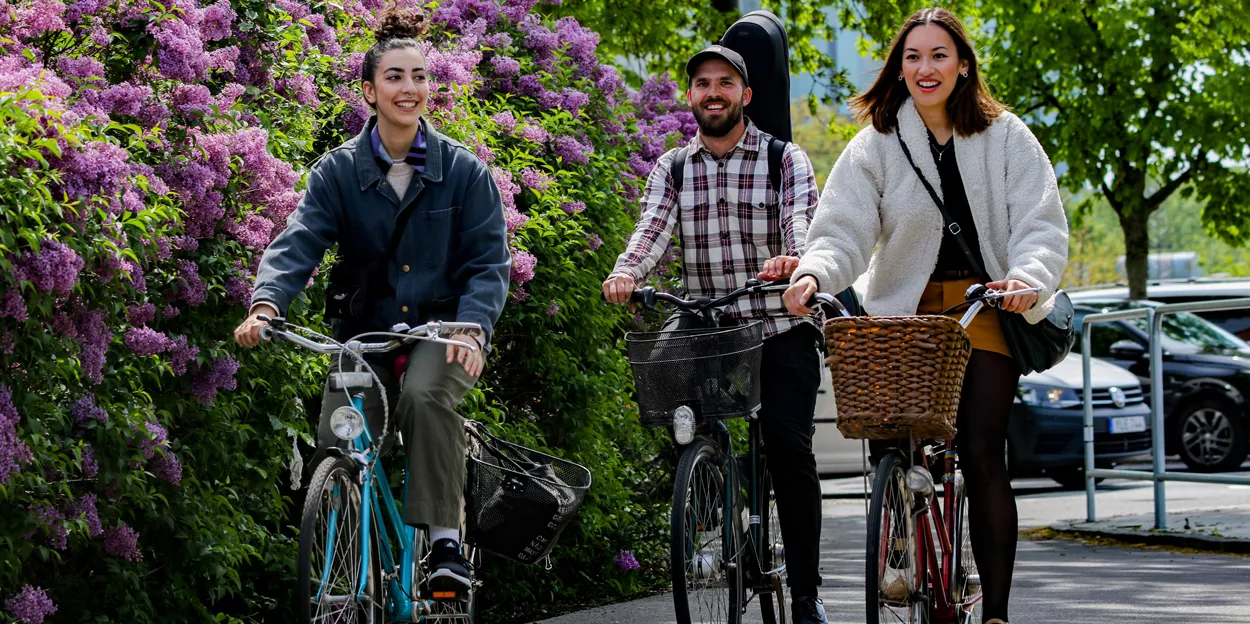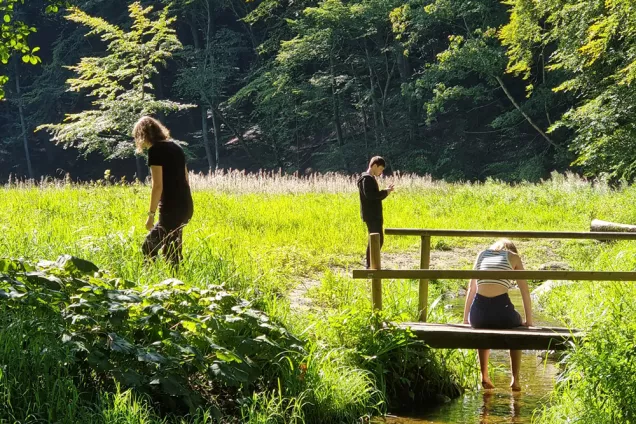Sustainable student life

As a student, there are many ways to get involved in different aspects of sustainability and live a more sustainable student life. Join (or start) a student organisation focused on sustainability, attend events and find out what you can do as an individual.
Join a sustainability initiative
Do you want to play an active role in sustainability issues? Getting involved with a sustainability-focused student organisation or other local initiative is a great way to do so.
We have collected some of the sustainability initiatives that students are involved in at Lund University. See the page below for a list.
Note that the organisations listed below also hold sustainability events.
ABC Sweden
ABC is a non-profit organisation focused on the environment, sustainability, fair trade, youth empowerment and waste reduction. They work both locally and internationally.
Bee the Change
This community gives students and other members the opportunity to learn about pollinators and beekeeping.
Bee the Change Lund Facebook page
Circle Centre
Circle Centre is a non-profit organisation that aims to reduce overconsumption by sharing household items, ideas and skills. Members can borrow items from their 'Library of Goods'.
Eos Cares
EOS Cares is the social sustainability programme of the basketball club IK EOS. It works to promote social sustainability and inclusion through various types of activities.
Extinction Rebellion Skåne
Extinction Rebellion (XR) is an international climate movement that uses peaceful civil disobedience to raise awareness and demand transition and systemic change.
Extinction Rebellion Skåne Facebook page
Food Saving Lund
To reduce food waste, Food Saving Lund regularly collects food from local retailers, stores it in food banks and distributes it to the community.
Food Saving Lund Facebook page
Fridays For Future Lund
Fridays for Future is an international movement that organises climate demonstrations every Friday. The movement calls for an increased political focus on climate change.
Fridays for Future Lund Facebook page
Lunds FN-Förening (Lund UN association)
Lunds FN-Förening is a local UN group in Lund that also cooperates with other UN-related groups. Its aim is to inform and involve individuals in UN-related issues.
Lunds Fältbiologer (Lund's field biologists)
Lunds Fältbiologer is a local branch of a national organisation for young people (up to 25 years old) that focuses on outdoor activities and nature education. It promotes nature and climate protection.
Lunds Fältbiologer website (in Swedish)
Lunds Naturskyddsförening (Lund's nature conservation association)
Lunds Naturskyddsföreningen is a local branch of a national organisation that works to protect nature, increase biodiversity and combat climate change.
PUSH Sverige (PUSH Sweden)
PUSH brings together different groups and individuals working on climate and sustainability issues. The organisation acts as a large network for those actively involved in sustainability.
Vi Odlar! (We Grow!)
Vi Odlar! is a project group within ABC Sweden that works with urban gardening. The organisation takes care of its local urban gardens and organises various workshops.
Podcast episode about sustainable living at Lund
Master's students Ronja from Finland and Fabio from Italy talk about their experiences with a flourishing sustainability initiative and share their tips.
Tips for a sustainable daily life
Small changes in your everyday life can add up to a more sustainable lifestyle. Consider adopting some of the habits below to make a positive difference. These tips are for inspiration only – focus on what's right and manageable for you.
#8 for sustainability!
We are committed to sustainability and are proud to be ranked 8th in the world for various aspects of sustainability (QS, 2024).
These tips can help you minimise food and packaging waste:
- Check what items you have in your pantry and fridge before you go shopping.
- Plan meals and buy only what you need (now or in the future).
- Look for vegetarian or vegan meal options.
- Check the expiration dates on perishable items in your pantry and fridge so you can use them before they go bad.
- Buy items in bulk or unpackaged if possible.
- Check 'Svinnsmart' sections in shops for discounted items nearing expiry – 'best before' dates don't mean immediate spoilage; trust your senses to judge quality.
- Avoid buying products that are known to have a significant negative impact on the environment.
- Prepare larger quantities of meals and freeze individual portions for later use.
- Improve your cooking skills to make the most of ingredients and reduce your reliance on packaged, processed foods.
- Get creative with leftover ingredients and turn them into new dishes.
- Buy your food in shops and restaurants rather than having it delivered.
- Use apps that focus on reducing food waste when ordering food (such as 'Too good to Go' or 'Karma').
- Buy fresh, local produce at farmers' markets to support local farmers.
Make your daily commute or trip more sustainable. Consider the following tips:
- Choose public transport, cycling or walking for your daily commute.
- Share rides with friends or classmates or use car and bike sharing services.
- Research green transport alternatives to minimise the impact of your travel.
You can make a positive impact by becoming a more conscious consumer. Consider the following tips:
- Think about whether you really want and need something before you buy it.
- Be aware that big sales can lead to impulse buying.
- Choose to buy products in-store rather than ordering online for delivery.
- Choose items known for their quality and durability to reduce the frequency of replacement.
- Carry a reusable water bottle, coffee cup and shopping bag to reduce disposable items.
- Use cloth napkins and towels instead of paper.
- Drink tap water, which is safe, free and widely available in cafés, university buildings and washrooms.
- Choose environmentally friendly cleaning and hygiene products.
- Create your own gifts and other items.
- Support local and sustainable brands where possible.
- Buy or rent clothes, furniture and other items from second-hand shops or from initiatives that recycle or reuse items.
- Donate or sell items you no longer need instead of throwing them away.
The following links will take you to the websites of local organisations where you can borrow or rent items for your home and everyday life.
To develop effective waste separation and reduction habits, consider the following tips:
- Check the waste separation guidelines to correctly sort plastic, paper, metal, glass and food waste.
- Identify designated waste collection points at your accommodation and university department.
- Ask your flatmates/classmates, landlord or relevant university/city staff if you are not sure how to separate waste correctly.
- Use 'pant' machines at supermarkets to recycle plastic bottles and cans and get a deposit voucher.
- Visit a recycling centre (Återvinningscentral in Swedish) to dispose of larger items of waste, such as broken furniture and electronics that cannot be repaired.
- Only for AF Bostäder tenants: As an AF Bostäder tenant, you have access to 'the Green Room' (gröna rummet) bulky waste facilities. You can drop off items that you no longer need and also pick up items that others no longer need.
See the links below for guidelines on how to separate your waste:
Here are some tips to help you use energy and water more wisely:
- Turn off lights, electronics and appliances when not in use.
- Unplug chargers and devices when not in use.
- Use energy-efficient LED bulbs.
- Limit your shower time and turn off the water when brushing your teeth.
- Air-dry clothes instead of using a tumble dryer.
If these things are within your control, you can also consider the following tips:
- Set thermostats to energy-efficient temperatures and consider using fans for cooling in milder weather.
- Consider switching to renewable energy sources or supporting clean energy suppliers.
These tips can help you share your passion for sustainability and improve your lifestyle:
- Get involved in local sustainability initiatives or student-led environmental organisations (see the section at the top of this page).
- Attend sustainability events to stay informed and engaged.
- Stay informed by reading articles, books, watching documentaries or listening to podcasts.
- Inspire your network by sharing your knowledge and experience, and by encouraging sustainable habits in a respectful way.
- Make a small donation to an initiative you believe in.
Questions, ideas or concerns?
Feel free to contact any of the organisations below.
Stay up to date and expand your knowledge
In today's fast-paced digital world, it can be a challenge to keep up with the latest information and opportunities. The resources below can help:
- Sustainability Forum Newsletter – research news and events at Lund University
- Sustainability Forum Student Network on Facebook – events, opportunities and discussions
- MOOCs (Massive Open Online Courses) on sustainability
- Access to articles, journals, theses and books through LUBsearch – Lund University Libraries website
Explore and enjoy Swedish nature
When in Sweden, do as many Swedes do and take advantage of the country's beautiful and varied landscapes. Explore and enjoy Swedish nature in a sustainable way by following the Right of Public Access, Allemansrätten, which gives everyone the freedom to do so.
Most places are accessible by public transport or bicycle.
The following resources can help you plan your trips to the great outdoors in Skåne and beyond.
- Outdoors and adventure in Skåne – visitskane.com
- Your guide to various outdoor activities in Swedish nature – naturkartan.se
- Sweden's national parks – sverigesnationalparker.se
- Local train and bus information – skanetrafiken.se
- Tourism and travel information – visitsweden.com
- Tips for travelling responsibly – visitsweden.com

Right of Public Access
Under 'Allemansrätten', you are free to enjoy Swedish nature without causing disturbance or damage.